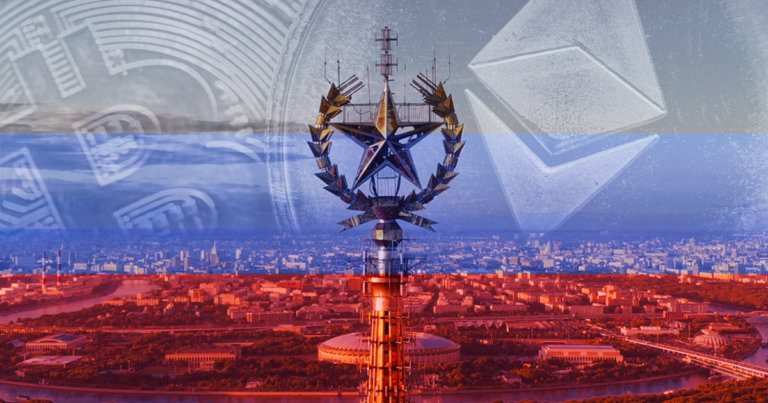 Why Russia can’t use crypto to evade sanctions
Why Russia can’t use crypto to evade sanctions Why Russia can’t use crypto to evade sanctions
Can the Russian regime and elite use crypto to evade sanctions? This is a heated debate among people in crypto, the media and some politicians. The answer according to crypto lawyer Jake Chervinsky is no.

Cover art/illustration via CryptoSlate. Image includes combined content which may include AI-generated content.
As the war in Ukraine is continuing on its sixth day, sanctions imposed on Russia are both widening and deepening. More and more countries and international institutions are implementing sanctions, and the sanctions already in place are getting tougher on the Russian regime.
While sanctions imposed on the infrastructure of traditional finance and payments have put severe pressure on the Russian society, questions have been rising if the Russian regime, but not necessarily its people, can use crypto such as bitcoin (BTC) and ether (ETH) to evade sanctions. Crypto is, after all, permissionless and free to anyone, including dictators, to use.
“Crypto’s use for sanctions evasion are totally unfounded”
According to Jake Chervinsky, Head of Policy at the crypto lobbying organization Blockchain Association and a well known “crypto lawyer”, the answer is no, for a variety of reasons.
In a Twitter thread, Chervinsky explains why he doesn’t believe Russian president Putin, or the nation’s elite can use crypto to evade sanctions.
“Concerns about crypto’s use for sanctions evasion are totally unfounded. They fundamentally misunderstand how sanctions work, how crypto markets work, and how Putin is actually trying to mitigate sanctions,” Chervinsky tweets.
In the U.S., sanctions must be authorized by the President in an executive order or by Congress in legislation. The Office of Foreign Assets Control (OFAC) designates specific targets for sanctions, such as individuals, companies and governments. OFAC adds targets to the Specially Designated Nationals And Blocked Persons (SDN) List. It is illegal for any US person to transact with any person on the SDN List.
Some people are suggesting that crypto could give Russia a way to evade or mitigate these sanctions. Is that plausible? Not at all, according to Chervisnky, and he gives three main reasons why.
“It doesn’t matter if they use dollars, gold, seashells, or bitcoin”
“Russia’s access to a global payment network has nothing to do with the goal of primary sanctions, cutting Russia off from the US economy. It’s illegal for US persons to transact with SDNs, period. It doesn’t matter if they use dollars, gold, sea shells, or bitcoin. US persons around the world are cutting ties with Russian SDNs right now, regardless of what payment systems they were using previously,” Chervinsky tweets.
“There’s zero reason to think crypto’s existence will convince any of them to willfully violate sanctions laws, risking fines or jail time.”
Regarding the SWIFT sanctions that was imposed on Russia in the beginning of the week, which stops Russian banks from transacting with foreign peers, Chervinsky does not think crypto can be a replacement.
“SWIFT is a service. Russia doesn’t get to use it anymore. That’s the sanction. Some Russian banks can still do cross-border transfers, they just can’t use SWIFT for that.
Crypto works the same way. US crypto companies offer a variety of services. Russia doesn’t get to use them anymore. That’s the sanction, just as with all U.S. goods and services,” Chervinsky tweets.
Russia is far more likely to use China’s CIPS
Though Russia may well use the technology itself, that doesn’t let them evade the sanctions.
If Russia wants an alternative, they’re far more likely to use China’s CIPS than a public network they can’t control.
The second reason, according to Chervinsky, is that crypto markets are too small, too costly, and not the least too transparent to be useful for the Russian economy.
“Crypto markets are thin to start with, and ruble trading pairs are rare. With Russia cut off from the world’s crypto industry, they can’t source nearly enough liquidity to matter. Russia also can’t hide its tracks with crypto.”
Third, the reality is Putin spent years trying to sanctions-proof Russia, crypto isn’t part of his plan. Putin’s strategy included diversifying Russia’s reserves into Chinese yuan and gold, shifting trade to Asia, and bringing manufacturing onshore. Putin could have built crypto infrastructure if he wanted. He didn’t. There’s no reason to think he will, or could, now.
“It’s important to understand that current sanctions are targeted, not comprehensive. The goal is not to injure ordinary Russian citizens. We’re very happy to see them dump their rubles for non-Russian digital assets. There’s enough liquidity for these citizens, but not oligarchs,” Chervinsky tweets.









































































































